A day after his assassination, Mahatma Gandhi featured across the front page of practically every major newspaper of the world as the symbol of loss that India would find hard to recover from.
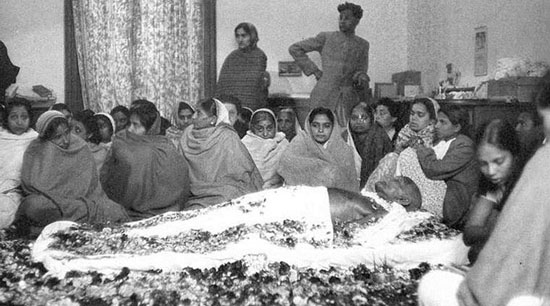
While the news of Gandhi’s assassination sent shockwaves across the country, nations across the globe were hardly insulated from this report. (Wikimedia Commons)
Around five months had passed since India had achieved her hard won independence, and less than a week since an official constitution came into force. Mohandas Karamchand Gandhi, the internationally acknowledged symbol of the Indian freedom struggle was on his way for prayer meeting scheduled for the evening. He was suddenly approached by a 35-year-old man named Nathuram Godse – a prominent member of the Hindu Mahasabha. He bent down in salutation in front of Gandhi before pulling out his revolver and shooting him thrice on the chest. Two hours later, Gandhi was declared dead, leaving the newly born nation mourning the loss of a father figure.
While the news of Gandhi’s assassination sent shockwaves across the country, nations across the globe were hardly insulated from this report. The Mahatma was revered almost as a demi-God in his country. However, internationally as well he had made a mark that very few Indians before him had achieved. Gandhi’s foremost priority in India was his fight for freedom from British rule. Internationally, however, he came to acquire a reputation for much more than nationalism. He was the symbol of peace and truth that leaders across the world found inspirational. To some he was the “apostle of nonviolence” while to others his fight against colonialism went above the regular politics of nationalism.
Gandhi did not just represent India’s nationalist pride, but clearly he was a world phenomenon as is evident from the urgency with which newspapers across the globe reported his death. A day after his assassination, Mahatma Gandhi featured across the front page of practically every major newspaper of the world as the symbol of loss that India would find hard to recover from.
The New York Times
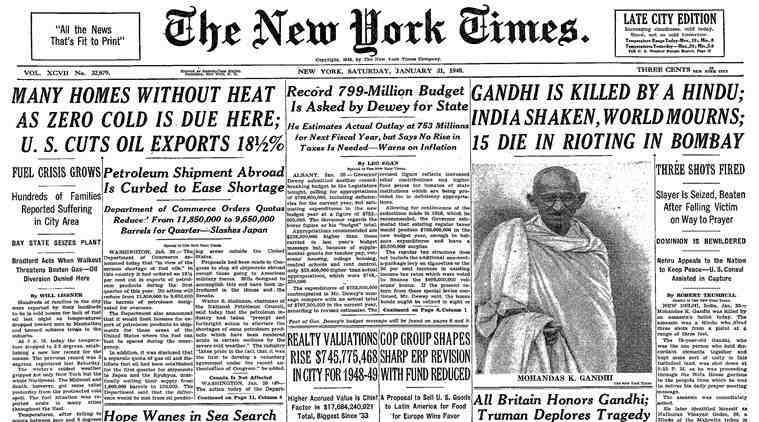
A front page story by the New York Times reported on Gandhi’s death with the headline Gandhi Is Killed By A Hindu; India Shaken, World Mourns; 15 Die In Rioting In Bombay Three Shots Fired. (Source: The New York Times)
A front page story by the New York Times reported on Gandhi’s death with the headline Gandhi Is Killed By A Hindu; India Shaken, World Mourns; 15 Die In Rioting In Bombay Three Shots Fired. The story gave a detailed account of the assassination, the frenzy that followed, Jawaharlal Nehru’s appeal to the nation and the attributes of the assassin.
Couple of days later, the American daily published a tribute to Gandhi following his funeral wherein it remarked upon the unparalleled impact of Gandhi on his nation’s history. The article titled The shadow of one man says the following:
What we can now say is that the enormous impact of Gandhi’s personality on humanity, as the flood of tributes to him has shown, gives us the strong hope that the yearning for peace and goodwill still lives, still strives and will survive.
The Irish Times
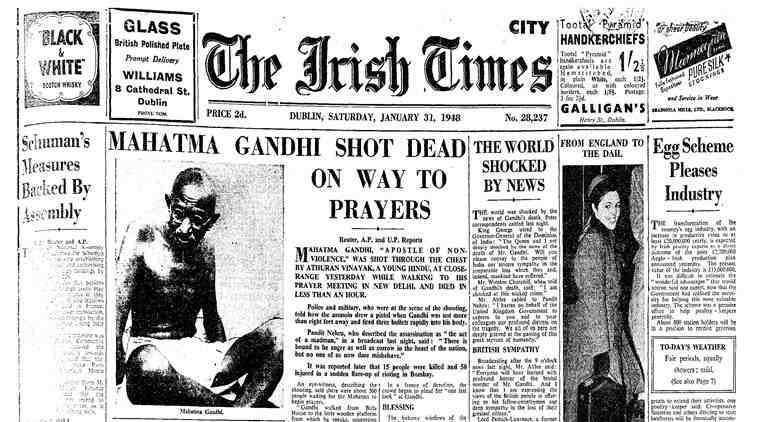
The front page of the Irish daily featured a detailed story of Gandhi’s assassination and the mourning that followed. (Source: The Irish Times)
The front page of the Irish daily featured a detailed story of Gandhi’s assassination and the mourning that followed. Hailing him as the “apostle of nonviolence”, the article remarked upon how his death brought together people from diverse socioeconomic backgrounds in united mourning.
In the vast throngs outside Birla House, sweeper women of the untouchable class, in their unwashed rags, last night rubbed shoulders with high caste Brahmins, women in silk sarees glittering with diamonds and with high government officials. For once, nobody seemed to care.
The Daily Telegraph
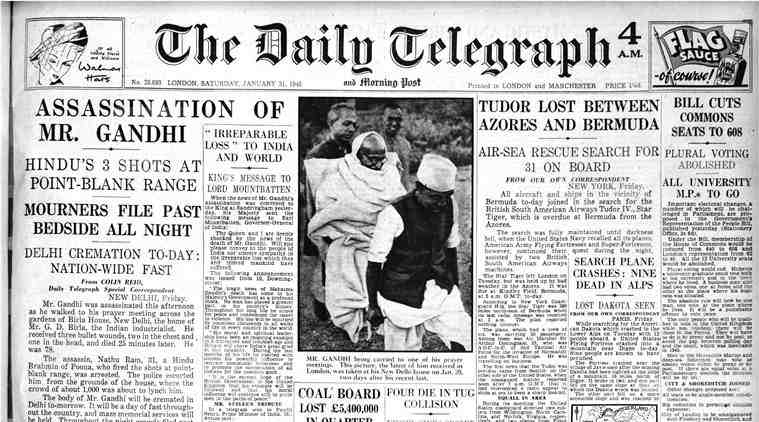
“The Daily Telegraph”, gave half of their front page to Gandhi’s assassination news. (Telegraph media group limited)
One of England’s most popular news daily, “The Daily Telegraph”, gave half of their front page to Gandhi’s assassination news. They called the incident “Irreparable loss to India and world”. Reporting on the announcement made from 10, Downing street, the article said the following:
The tragic news of Mahatma Gandhi’s has come to his Majesty’s government as a profound shock. No man has played a greater part in his country’s history. Throughout his long life he strove for peace and condemned the resort to violence. His loss will be mourned by countless, thousands in all walks of life in every country in the world.
The Economist
The English language weekly came out with a tribute to Gandhi following his death wherein they reflected upon the legacy left behind by the nationalist leader, not just in India but also in Britain where he was highly admired.
British regard for Gandhi is something more than the respect given to a politician sincerely devoted to his principles and prepared to die for them. It is a recognition that in Gandhi’s “soul force” there was a moral and religious factor transcending the ordinary politics of nationalism or democracy.
The Economist went on to remark upon how the ideologies developed by Gandhi that wove together modern theories of democracy with religious notions had been framed by Indian intellectuals before Gandhi as well. However, it was the Mahatma under whose supervision these ideologies became a real political force. Gandhi’s contribution to Indian political development in that sense was unique and is what set him apart from every other Indian nationalist leader.
The Washington Post
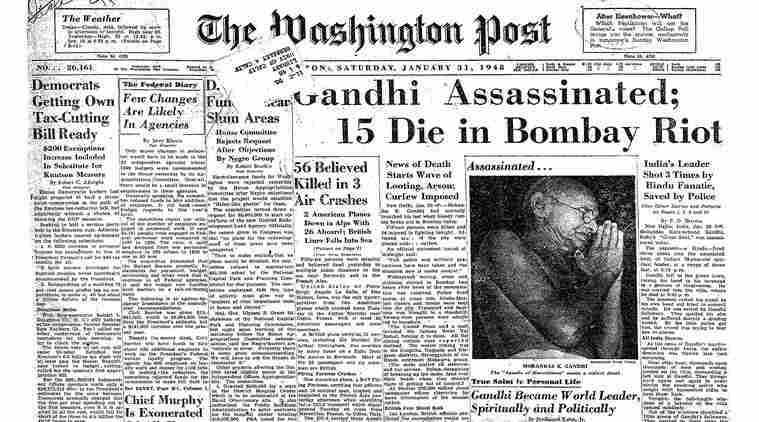
Writing about the personal attributes of the father of the Indian nation, the Washington Post said that Gandhi became world leader spiritually and politically. (Source: The Washington Post)
The popular American newspaper published a long front page report on Gandhi’s death commenting upon the riots that followed and the reactions from the international community. Writing about the personal attributes of the father of the Indian nation, the Washington Post said that Gandhi became world leader spiritually and politically. The following words written in the news daily provide the a true insight into the methods taught by Gandhi and the achievements he made.
There was no device of politics or publicity which he did not know and use. He could and did outwit the best political brains the British could send against him.
He was also a spiritual force of great power, the first in hundreds of years to stir the multitudes of the great subcontinent of India. He used his spiritual leadership as a weapon in winning independence from the British Empire.
© The Indian Express Online Media Pvt Ltd
![]()

